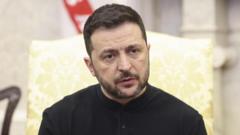In a dramatic turn of events, European leaders immediately rallied behind President Zelensky, flooding social media with messages of support. The exchange came after a tense dialogue in the Oval Office where Trump urged Zelensky to negotiate with Russia, questioning Ukraine's appreciation for U.S. aid and hinting that military support could be withdrawn if a deal isn't reached. Zelensky's swift responses on social media acknowledged each leader, affirming their crucial backing.
Emmanuel Macron, France's President, declared unequivocally that Russia is the aggressor in the ongoing conflict, insisting that aiding Ukraine was the right stance. Dutch Prime Minister Dick Schoof reiterated that the Netherlands will support Ukraine "now more than ever," expressing a desire for peace and an end to hostilities. Germany's Chancellor Olaf Scholz remarked on the strong yearning for peace among Ukrainians, echoed by his successor Friedrich Merz who reinforced support for Ukraine in this challenging war.
Messages of solidarity poured in from leaders across Europe and beyond, including support from Canada and Australia. However, contrasting views emerged, notably from Hungary's Prime Minister Viktor Orban, who sided with Trump. Orban's remarks criticized Zelensky while endorsing Trump's approach, highlighting a diverging perspective amid the European unity.
In a follow-up interview, President Zelensky stated that the conflict with Trump was detrimental to both parties but expressed hope for rebuilding the relationship. It was during this heated Oval Office encounter that Vice-President JD Vance prompted discussion about ending the war, leading to an exchange where Zelensky referenced failed past diplomatic efforts, signaling the complexity of the situation.
The discussions in London are poised to further outline strategic partnerships aimed at navigating the future of Ukraine, potentially involving significant military support. As European leaders gear up to collaborate, the spotlight remains on achieving a peaceful resolution that judiciously protects Ukraine’s territorial integrity and the alliance's interests against Russian aggression.
Emmanuel Macron, France's President, declared unequivocally that Russia is the aggressor in the ongoing conflict, insisting that aiding Ukraine was the right stance. Dutch Prime Minister Dick Schoof reiterated that the Netherlands will support Ukraine "now more than ever," expressing a desire for peace and an end to hostilities. Germany's Chancellor Olaf Scholz remarked on the strong yearning for peace among Ukrainians, echoed by his successor Friedrich Merz who reinforced support for Ukraine in this challenging war.
Messages of solidarity poured in from leaders across Europe and beyond, including support from Canada and Australia. However, contrasting views emerged, notably from Hungary's Prime Minister Viktor Orban, who sided with Trump. Orban's remarks criticized Zelensky while endorsing Trump's approach, highlighting a diverging perspective amid the European unity.
In a follow-up interview, President Zelensky stated that the conflict with Trump was detrimental to both parties but expressed hope for rebuilding the relationship. It was during this heated Oval Office encounter that Vice-President JD Vance prompted discussion about ending the war, leading to an exchange where Zelensky referenced failed past diplomatic efforts, signaling the complexity of the situation.
The discussions in London are poised to further outline strategic partnerships aimed at navigating the future of Ukraine, potentially involving significant military support. As European leaders gear up to collaborate, the spotlight remains on achieving a peaceful resolution that judiciously protects Ukraine’s territorial integrity and the alliance's interests against Russian aggression.





















